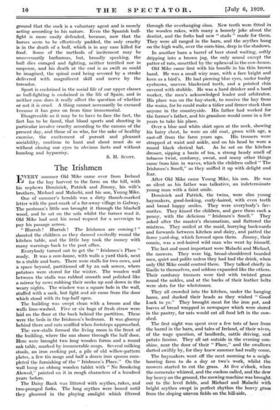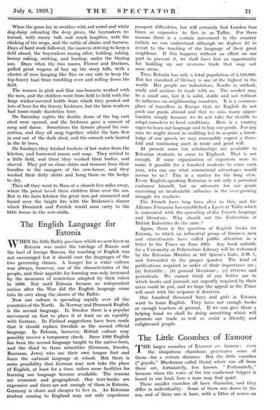The Irishmen F . VERY summer Old Mike came over from Ireland
for the hay harvest to the farm on the hill, with his nephews Dominick, Patrick and Jimmy, his wife's brothers, Michael and Malachi, and his son, Young Mike.
One of summer's heralds was a dirty thumb-marked letter with the post-mark of a far-away village in Galway. The postman's little son brought it through the bluebell wood, and he sat on the sofa whilst the farmer read it. Old Mike had sent his usual request for a sovereign to pay his passage across.
" Hurrah ! Hurrah ! The Irishmen are coming ! " shouted the children as they danced excitedly round the kitchen table, and the little boy took the money with many warnings back to the post office.
Everybody turned out to get the " Irishmen's Place" ready. It was a cow-house, with walls a yard thick, next to a stable and barn. There were stalls for two cows, and a space beyond, partitioned off by an oak screen, where potatoes were stored for the winter. The wooden wall between the stalls was rubbed smooth and polished like a mirror by cows rubbing their necks up and down in the weary nights. The window was a square hole in the wall, stuffed with a sack, but light and air came from the door which stood with its top-half open.
The building was swept clean with a broom and the walls lime-washed. Five or six bags of fresh straw were laid on the floor at the back behind the partition. These were the beds in the Irishmen's bedroom. It was gloomy behind there and rats scuffled when footsteps approached.
The cow-stalls formed the living room in the front of the building, where the sun shone through the half door. Here were brought two long wooden forms and a round oak table, marked by innumerable mugs. Several milking stools, an iron cooking pot, a pile of old willow-pattern plates, a few tin mugs and half a dozen iron spoons com- pleted the furnishing of the "Irishmen's Place." On the wall hung an oblong wooden tablet with "No Smokeing Alowed," painted on it in rough characters of a hundred years before.
The Daisy Bank was littered with scythes, rakes, and two-pronged forks. The long scythes were honed until they gleamed in the playing sunlight which filtered through the overhanging elms. New teeth were fitted in the wooden rakes, with many a homely joke about the dentist, and the forks had new " stails " made for them. They were all ranged in the barn, and the scythes hung on the high walls, over the corn-bins, deep in the shadows.
In another barn a barrel of beer stood waiting, softly dripping into a brown jug, the only sound except the patter of rats, unsettled by the upheaval in the cow-house.
Old Mike came first with his bundle in his thin brown hand. He was a small wiry man, with a face bright and keen as a bird's. He had piercing blue eyes, under bushy eyebrows, uneven blackened teeth, and a pointed chin covered with stubble. He was a hard drinker and a hard worker, the men's acknowledged leader and arbitrator.
His place was on the hay-stack, to receive the hay from the wains, for he could make a tidier and firmer stack than anyone in the countryside. His father had worked for the farmer's father, and his grandson would come in a few years to take his place.
Over a blue and white shirt open at the neck, showing his hairy chest, he wore an old coat, green with age, a cast-off from the farm years ago. His trousers were strapped at waist and ankle, and on his head he wore a round black clerical hat. As he sat on the kitchen dresser, sipping a basin of tea, a strong heady smell of tobacco twist, corduroy, sweat, and many other things came from him in waves, which the children called " The Irishmen's Smell," as they sniffed it up with delight and fear.
After Old Mike came Young Mike, his son. He was as silent as his father was talkative, an indeterminate young man with a faint smile.
Dominick and Patrick, the twins, were slim young haymakers, good-looking, curly-haired, with even teeth and broad happy smiles. They were everybody's fav- ourites. They kissed the children, and gave them each a penny, with the delicious "Irishmen's Smell." They asked after the master's rheumatism, and flattered the mistress. They smiled at the maid, hurrying backwards and forwards between kitchen and dairy, and patted the fierce yard-dog, which fawned upon them. Jimmy, their cousin, was a red-haired wild man who went by himself.
The last and most important were Malachi and Michael, the mowers. They were big, broad-shouldered bearded men, quiet and polite unless they had had the drink, when only Old Mike could control them. They talked chiefly in Gaelic to themselves, and seldom expanded like the others. Their corduroy trousers were tied with twisted grass round the ankles, and at the backs of their leather belts were slots for the whetstones.
They all crowded into the kitchen, under the hanging hams, and ducked their heads as they wished "Good Luck to ye." They brought meat for the iron pot, and loaves of bread wrapped in newspaper which were stored in the pantry, for rats would eat all food left in the cow- shed.
The first night was spent over a few tots of beer from the barrel in the barn, and tales of Ireland, of their wives, of the wage question, of landlords, cattle driving, and potato famine. They all sat outside in the evening sun- shine, near the door of their "Place," and the swallows darted swiftly by, for they knew summer had really come.
The haymakers went off the next morning to a neigh- bouring farm to do a day or two's work, whilst the mowers started to cut the grass. At five o'clock, when the corncrake whirred, and the cuckoo called, and the dew lay heavy on the ground, the mowing machine was brought out to the level fields, and Michael and Malachi with bright scythes swept in perfect rhythm the heavy grass from the sloping uneven fields on the hill-side. . When the grass lay in swathes with red sorrel and white dog-daisy colouring the deep green, the haymakers re- turned, with merry talk and much laughter, with the clinking of tin mugs, and the rattle of chains and harness. Days of hard work followed, the mowers striving to keep a field ahead, the haymakers racing after, tedding, raking, bonny raking, cocking, and leading, under the blazing sun. Days when the two mares. Flower and Duchess, pulled great wagons of hay up the steep hills: with a cluster of men hanging like flies on one side to keep the top-heavy load from tumbling over and rolling down the field.
The women in pink and lilac sun-bonnets worked with the men, and the children went from field to field with the large wicker-covered bottle from which they poured out tots of beer for the thirsty Irishmen, but the farm workers had home-made dandelion beer.
• On Saturday nights the double doors of the big cart shed were opened, and the Irishmen gave a concert of song and dance. Sometimes the farmer played his con- certina, and they all sang together, whilst the bats flew in and out of the dark shed, and the screech owls hooted in the fir trees.
On Sundays they fetched buckets of hot water from the kitchen, and borrowed razors and soap. They retired to a little field, and there they washed their bodies, and shaved. They put on clean shirts and trousers from their bundles in the mangers of the cow-house, and they washed their dirty shirts and hung them on the hedge to dry.
Then off they went to Mass at a church five miles away, where the priest loved these children from over the sea. But in the farm kitchen the great iron pot simmered and hissed over the bright fire with the Irishmen's dinner which Dominick and Patrick would soon carry to the little house in the cow-stalls.











































 Previous page
Previous page